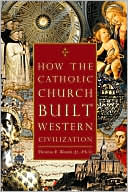Good stuff from Touchstone:
...A homely example: I am asked by high church Lutheran about the arrangement of the platform (chancel) furniture in an Evangelical church. The pulpit is elevated above the communion table, and in the center. He doesn’t like this, but understands the reason. But what of those flags? What is the meaning of their arrangement? The American flag is given the place the Flag Code demands for it in all such display situations: in the place of honor on the speaker’s right. But what is that other flag over there on the speaker’s left? Ah--that is a fairly recent invention called the “Christian Flag.” The kids learn, or at least used to learn, a pledge to it which indicates that it stands for the Savior’s Kingdom. But why, then, if that is the case, is it given a place on the podium inferior to that of a national emblem--any national emblem? This is a clear symbolic statement that the Kingdom of God is being treated--in a church, forsooth!--as in some sense inferior or subordinate to the United States of America,...
The apostasy of a church rarely happens as the result of an epiphany; it is normally a slow process involving “certain currents of ideas” plunged into because they seem modern and successful, a drift, unresisted, unstudied (or only prejudicially studied), and prayed about dishonestly only after the current has been entered. After years of concentrating on the worship of Jesus (lex orandi), God becomes something subtly but significantly different in our minds than the Trinity of orthodox faith (lex credendi), just as after years of adjusting the scriptures to answer to our sect’s distinctive beliefs, elementally profound departures from the faith and practice of the universal church seem no more than reasonable concessions to the way people think these days, and what they enjoy (how else can we “evangelize” them?). These are now taken up into our doctrine and defended by the same kind of dodging we have always used to avoid the parts of the Bible that trouble us. (whole article here)


No comments:
Post a Comment